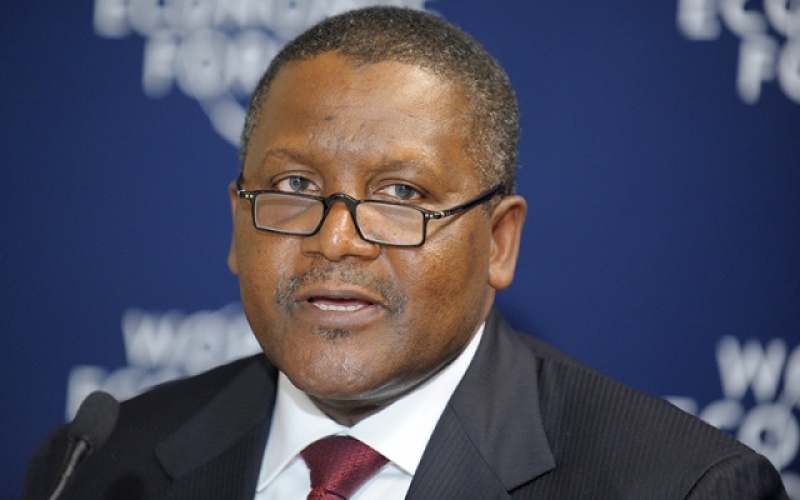The number of billionaires in Africa – and the size of their fortunes – continues to drop. On this year’s list, FORBES is only including African billionaires living in Africa, instead of featuring Africa’s 50 richest people. There are 21 billionaires on this year’s list, worth a combined $70 billion. On the November 2015 Africa Rich List, there were 23 African billionaires worth a combined $79.8 billion. That in turn was down from 28 African billionaires in 2014.
Nigerian cement tycoon Aliko Dangote remains Africa’s richest person for the sixth year running with a $12.1 billion fortune, despite a nearly $5 billion drop in his net worth for the second year in a row. Dangote is joined by just two other Nigerian billionaires on this year’s list – telecom tycoon Mike Adenuga, who is Africa’s third richest person with an estimated $5.8 billion fortune, and oil billionaire Folorunsho Alakija, who has an estimated net worth of $1.6 billion. Two Nigerians dropped off the Billionaires List this year – oil marketer Femi Otedola, whose net worth dropped from $1.6 billion in November 2015 to just $330 million today, and sugar billionaire Abdulsamad Rabiu, whose net worth dropped below $1 billion in the wake of a weakened Nigerian currency.
South Africa retains its dominance on the Africa List. While the country is tied with Egypt for the largest number of individual billionaires, South Africa’s six billionaires are worth a combined $22.7 billion – $7 billion more than Egypt’s six billionaires. The richest South African billionaire and the continent’s second richest person is diamond magnate Nicky Oppenheimer, who has maintained a low profile since selling his family’s stake in diamond giant De Beers to Anglo American for $5.1 billion in cash in 2012. Luxury goods tycoon Johann Rupert and retail magnate Christoffel Wiese are tied as South Africa’s second richest and Africa’s fourth richest billionaires, each with a $5.5 billion fortune. Wiese’s fortune has dropped $1 billion since the November 2015 Africa list, while Rupert’s net worth is down $800 million.
Egypt’s richest billionaire is Nassef Sawiris, whose $5.3 billion fortune is up $400 million since November 2015. Sawiris runs OCI, one of the world’s largest nitrogen fertilizers. The country’s next richest person is his brother Naguib Sawiris, who was Egypt’s biggest gainer on the list. His net worth increased $700 million to $3.7 billion. In December 2016, Naguib Sawiris announced that he would be stepping down as CEO of his telecom company, Orasom Telecom Media & Technology.
FORBES counts only two female billionaires in Africa: Angola’s Isabel dos Santos – Africa’s richest woman with a $3.2 billion fortune, and Nigeria’s Alakija. Dos Santos is the daughter of Angola’s president, who appointed her as head of Angola’s state oil firm Sonangol in June 2016. Alakija is the vice chair of Nigerian oil exploration company, Famfa Oil.
At 41, Tanzanian Mohammed Dewji is Africa’s youngest billionaire, well below the average age of 63. He is CEO of conglomerate METL, which his father founded in the 1970s. Eighty-six-year-old Onsi Sawiris of Egypt is the continent’s oldest billionaire and the father of two other African billionaires – Nassef and Naguib Sawiris.
Thirteen out of Africa’s 21 billionaires have self-made fortunes, while the other eight inherited their fortunes. The 21 billionaires hail from seven countries: South Africa, Egypt, Nigeria, Morocco (which has three billionaires), Algeria (one billionaire), Angola (one billionaire) and Tanzania (one billionaire).
METHODOLOGY
Our list tracks the wealth of African billionaires who reside on the continent, thus excluding Sudanese-born billionaire Mo Ibrahim, who is a UK citizen, and billionaire London resident Mohamed Al-Fayed, an Egyptian citizen. This year’s list includes only billionaires, rather than the 50 richest people in Africa. We calculated net worths using stock prices and currency exchange rates from the close of business on Thursday, January 5. To value privately-held businesses, we couple estimates of revenues or profits with prevailing price-to-sales or price-to-earnings ratios for similar public companies.
We have purposely excluded dispersed family fortunes such as the Chandaria family of Kenya and the Madhvanis of Uganda, because the wealth is believed to be held by dozens of family members. We do include wealth belonging to a member’s immediate relatives if the wealth can be traced to one living individual; in that case, you’ll see “& family” on our list as an indication.
Source: by Kate Vinton, FORBES AFRICA

































